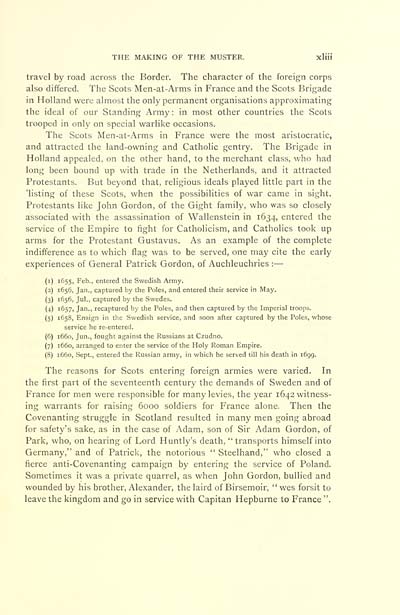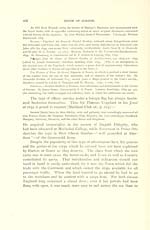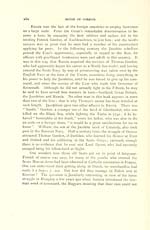New Spalding Club > House of Gordon > Gordons under arms
(53) Page xliii
Download files
Complete book:
Individual page:
Thumbnail gallery: Grid view | List view

THE MAKING OF THE MUSTER. xlui
travel by road across the Border. The character of the foreign corps
also differed. The Scots Men-at-Arms in France and the Scots Brigade
in Holland were almost the only permanent organisations approximating
the ideal of our Standing Army : in most other countries the Scots
trooped in only on special warlike occasions.
The Scots Men-at-Arms in France were the most aristocratic,
and attracted the land-owning and Catholic gentry. The Brigade in
Holland appealed, on the other hand, to the merchant class, who had
long been bound up with trade in the Netherlands, and it attracted
Protestants. But beyond that, religious ideals played little part in the
'listing of these Scots, when the possibilities of war came in sight.
Protestants like John Gordon, of the Gight family, who was so closely
associated with the assassination of Wallenstein in 1634, entered the
service of the Empire to fight for Catholicism, and Catholics took up
arms for the Protestant Gustavus. As an example of the complete
indifference as to which flag was to be served, one may cite the early
experiences of General Patrick Gordon, of Auchleuchries : —
(i) 1655, Feb., entered the Swedish Army.
(2) 1656, Jan., captured by the Poles, and entered their service in May.
(3) 1656, Jul., captured by the Swedes.
(4) 1657, Jan., recaptured by the Poles, and then captured by the Imperial troops.
(5) 1658, Ensign in the Swedish service, and soon after captured by the Poles, whose
service he re-entered.
(6) 1660, Jun., fought against the Russians at Czudno.
(7) 1660, arranged to enter the service of the Holy Roman Empire.
(8) 1660, Sept., entered the Russian army, in which he served till his death in 1699.
The reasons for Scots entering foreign armies were varied. In
the first part of the seventeenth century the demands of Sweden and of
France for men were responsible for many levies, the year 1642 witness-
ing warrants for raising 6000 soldiers for France alone. Then the
Covenanting struggle in Scotland resulted in many men going abroad
for safety's sake, as in the case of Adam, son of Sir Adam Gordon, of
Park, who, on hearing of Lord Huntly's death, "transports himself into
Germany," and of Patrick, the notorious " Steelhand," who closed a
fierce anti-Covenanting campaign by entering the service of Poland.
Sometimes it was a private quarrel, as when John Gordon, bullied and
wounded by his brother, Alexander, the laird of Birsemoir, " wes forsit to
leave the kingdom and go in service with Capitan Hepburne to France ".
travel by road across the Border. The character of the foreign corps
also differed. The Scots Men-at-Arms in France and the Scots Brigade
in Holland were almost the only permanent organisations approximating
the ideal of our Standing Army : in most other countries the Scots
trooped in only on special warlike occasions.
The Scots Men-at-Arms in France were the most aristocratic,
and attracted the land-owning and Catholic gentry. The Brigade in
Holland appealed, on the other hand, to the merchant class, who had
long been bound up with trade in the Netherlands, and it attracted
Protestants. But beyond that, religious ideals played little part in the
'listing of these Scots, when the possibilities of war came in sight.
Protestants like John Gordon, of the Gight family, who was so closely
associated with the assassination of Wallenstein in 1634, entered the
service of the Empire to fight for Catholicism, and Catholics took up
arms for the Protestant Gustavus. As an example of the complete
indifference as to which flag was to be served, one may cite the early
experiences of General Patrick Gordon, of Auchleuchries : —
(i) 1655, Feb., entered the Swedish Army.
(2) 1656, Jan., captured by the Poles, and entered their service in May.
(3) 1656, Jul., captured by the Swedes.
(4) 1657, Jan., recaptured by the Poles, and then captured by the Imperial troops.
(5) 1658, Ensign in the Swedish service, and soon after captured by the Poles, whose
service he re-entered.
(6) 1660, Jun., fought against the Russians at Czudno.
(7) 1660, arranged to enter the service of the Holy Roman Empire.
(8) 1660, Sept., entered the Russian army, in which he served till his death in 1699.
The reasons for Scots entering foreign armies were varied. In
the first part of the seventeenth century the demands of Sweden and of
France for men were responsible for many levies, the year 1642 witness-
ing warrants for raising 6000 soldiers for France alone. Then the
Covenanting struggle in Scotland resulted in many men going abroad
for safety's sake, as in the case of Adam, son of Sir Adam Gordon, of
Park, who, on hearing of Lord Huntly's death, "transports himself into
Germany," and of Patrick, the notorious " Steelhand," who closed a
fierce anti-Covenanting campaign by entering the service of Poland.
Sometimes it was a private quarrel, as when John Gordon, bullied and
wounded by his brother, Alexander, the laird of Birsemoir, " wes forsit to
leave the kingdom and go in service with Capitan Hepburne to France ".
Set display mode to: Large image | Transcription
Images and transcriptions on this page, including medium image downloads, may be used under the Creative Commons Attribution 4.0 International Licence unless otherwise stated. ![]()
| Publications by Scottish clubs > New Spalding Club > House of Gordon > Gordons under arms > (53) Page xliii |
|---|
| Permanent URL | https://digital.nls.uk/79781333 |
|---|
| Description | Volumes 47-53 are uniform with but not part of the club's series. |
|---|---|

